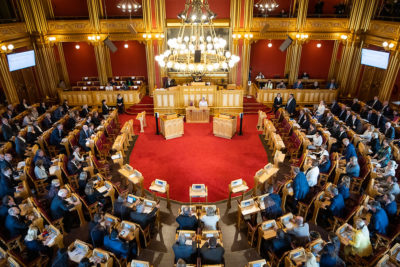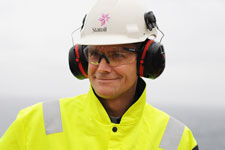Several Members of Parliament, professors and not least editorial writers at Norwegian newspapers are all demanding an external and independent investigation of Norway’s state-owned oil company Equinor. They want to know how Equinor, the former Statoil, could lose a stunning NOK 200 billion on its investments in the US, without the government noticing.

An investigation, along with a hearing conducted by either the Parliament’s energy-, business or disciplinary committee, would also likely force an explanation from the man who was chief executive at Statoil during the years when the poor investments in shale oil and gas projects iin the US were made: Helge Lund.
Lund is now chairman of British oil giant BP and has been “silent as a deep-water well,” wrote Norwegian commentator Frithjof Jacobsen, since newspaper Dagens Næringsliv (DN) first exposed all the huge losses on investments made on his watch. Lund has consistently refused to answer any questions about what’s been called Norway’s biggest industrial scandal ever, either from DN or other media, and DN’s Jacobsen recently wondered “how long can he get away with that?” Others have been wondering the same.

The proverbial oyster knife that may force Lund’s mouth to open is most likely found in Parliament. The Norwegian state still owns 67 percent of the former Statoil that changed its name to Equinor in 2018. The state, as Equinor’s largest owner, can hold a parliamentary hearing that could call in everyone with relevant information to testify. Lund would more than likely be among them.
Equinor’s current board, meanwhile, has already announced that it’s launching its own examination of its controversial international operations, to be led by international consulting and accounting firm PwC. “That’s good, but it won’t replace what the Parliament will do,” Espen Barth Eide of the Labour Party, who served as both defense- foreign minister when Lund headed Statoil, told DN late last week. “The Parliament’s questions have a lot to do with government responsibility.”
PwC itself has stressed that it’s not carrying out an actual investigation into aspects of the US operations that have drawn so much criticism. It will rather concentrate on Equinor’s own accounting of, or control over, the losses – or the lack thereof. Equinor gave in to calls from analysts and others surprised by the extend of the losses to finally start reporting US results separately.
State’s ownership role also under fire
Labour’s former left-center government partners are also calling for the Parliament’s own investigation into its most critical issues, most likely to primarily probe how the current Conservatives’ led government has monitored the state’s ownership in Statoil/Equinor. Both the Socialist Left (SV) and Center parties think it’s up to the company’s biggest owner (the state) to examine how Statoil/Equinor has operated.
“An internal (Equinor-initiated) evaluation and the oil minister’s evaluation won’t be enough to restore public confidence in Norway’s biggest and most important company,” said MP Geir Pollestad of the Center Party after Oil Minister Tina Bru addressed Parliament last week on what’s been called Norway’s biggest industrial scandal ever. It was Pollestad’s own Center Party, however, which held political control of the former Statoil when many of the US investments were initiated and ultimately managed by Helge Lund. The Center Party’s own former oil ministers should thus face questions as well.

MP Kari Elisabeth Kaski of SV had been calling for an external investigation of Equinor long before Bru addressed Parliament last week. “This is so serious and affects our confidence in the largest company on the Norwegian Continental Shelf,” Kaski told DN. She wants the parliament’s disciplinary committee (Kontroll- og konstitusjonskommité) to handle an investigation, but it may be assigned to either the energy committee or the one handling business and industry, which is headed by Pollestad. Bru’s own accounting of how she’s dealing with Equinor was sent to both the latter two.
It’s Bru, as oil minister, who’s currently responsible for how the state manages its investment in Equinor. She has scolded Equinor, and called in its current chief executive, Eldar Sætre, along with board leader Jon Erik Reinhardsen shortly after the “scandal” at Statoil/Equinor hit the headlines. She has said she still has confidence in Equinor’s board, however, and she resisted calls from, among others, Professor Ola Kvaløy at the University of Stavanger to replace the board. Kvaløy, like Professor Thore Johnsen at the Norwegian business school NHH (Norges Handelshøyskole), has also questioned whether Sætre (who earned NOK 15.3 million last year, the most of all of Norway’s big companies in which the state has a major stake) should keep his job. Sætre has defended his role in the scandal.
Ministry tightens its grip
The state, as a major shareholder in several large Norwegian companies, has always resisted meddling in management affairs. Bru, however, is tightening the ministry’s grip on Equinor and initiated yet another annual meeting between minister and management regarding Equinor’s accounts. “There’s a need to more closely follow up the US operations in the future,” Bru said.
She was called into Parliament herself last week, and candidly admitted that the government had never been made aware of the extent of Statoil/Equinor’s losses. She claimed Equinor “should have been more open with its owner (the state),” and said from the podium that in Parliament that “Equinor’s operations in the USA have received lots of negative attention, and rightly so.”
Bru, who just took over as oil minister in January, also stated that the huge accumulated losses (of which even oil analysts following Statoil/Equinor weren’t fully aware) “could have been made more easily available, and that management agrees. I have clear expectations that they will follow up on that.” Of the roughly USD 20.4 billion in losses, around USD 9 billion were tied to Equinor’s land-based shale oil investments, USD 4 billion to write-offs in the Gulf of Mexico and Bahamas, another USD 4 billion to dry wells and costs in the Gulf, USD 3 billion to finance costs and USD 1 billlion to losses on contracts. The ministry had only been made aware of around USD 9 billion in losses.
Bru is left to launch what some are calling “the clean-up job” at Equinor. At issue, according to Governance Group partner Kristian R Andersen, is what happens “when a board loses steering over a company and the company’s major owners are asleep.” Thus the calls for a Parliamentary investigation by its disciplinary committee, that should lead to changes at the company and, not least, its communications strategy. Equinor officials themselves have claimed that they need “to learn” from their mistakes in the US
“This must be lifted out of Equinor’s lap, to give an investigation the credibility it needs,” editorialized newspaper Dagsavisen over the weekend. The goal, it continued, is to uncover critical aspects of Equinor’s investment evaluations, control and culture, and the ministry’s own routines.
NewsInEnglish.no/Nina Berglund

